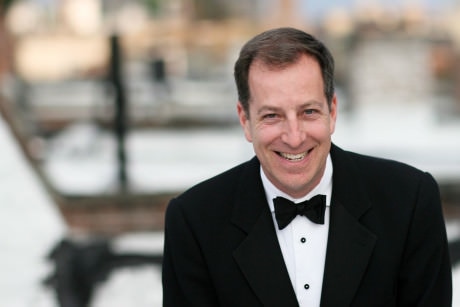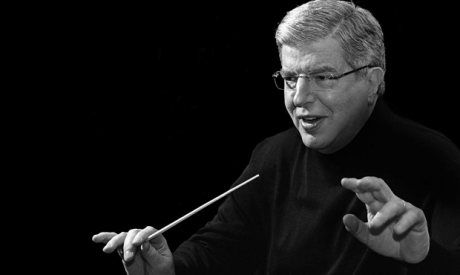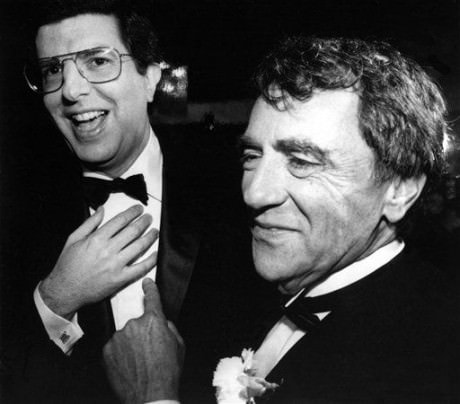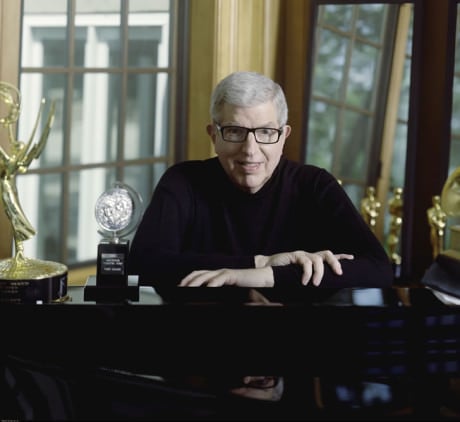What better place to celebrate the life and work of Marvin Hamlisch than right here in Washington? But the reasons for An Evening with the Music of Marvin Hamlisch on Monday, October 19, 2015 with Broadway stars Lindsay Mendez, Capathia Jenkins, Bryce Pinkham, and Whitney Bashor go beyond Marvin’s tenure as Pops Conductor of the National Symphony Orchestra or his lauded appearances at Wolf Trap and elsewhere. Earlier this year the collection of Marvin Hamlisch’s papers arrived at the Library of Congress, where their extensive cataloguing has revealed more about Marvin’s life and genius than are already reflected in his remarkably diverse output for stage, screen, cabaret and concert hall.
Heading the celebration on October 19, 2015 is veteran Broadway music director, Tony Award-winning orchestrator, and musical jack-of-all-trades Ted Sperling. Ted has been working with Mark Horowitz of the Library’s music division to craft a mix of songs and stories to bring the well-known and unknown Marvin musical genius to light. A gala presentation that Ted conducted in Central Park of Marvin’s work in June 2014, as well as Ted’s close friendship with Marvin’s widow Terre, have further informed the project.

I recently caught up with Ted by telephone between his rehearsals for a Broadway revival of Fiddler on the Roof to preview the Hamlisch evening at the Coolidge Auditorium of the Library of Congress. Here are excerpts from our conversation:
David: Ted, tell me about the genesis of this event that’s going to take place at the Library of Congress.
Ted: I was approached by the Library so they know more authoritatively than I. But I do believe that it was the acquisition of the papers that spurred the idea for the concert.
Tell me how you’ve come to be identified with Marvin’s work within your very extensive career.
I actually never met Marvin. It’s funny because we certainly traveled in all the same circles, and for most of my life people have told me I look like him. And I’m very sad that we never had any contact really. I think we would have, had he lived longer. I think our paths were heading toward an intersection.
There was one missed opportunity. There was a planned musical about Liberace that ultimately became an HBO film instead [called Behind the Candelabra] for which Marvin wrote music, and when it was going to be a Broadway musical there was some talk about our both being involved. But it never got past the very early stages, so we never met on it.
But I have since directed a gala performance in Central Park for the Public Theater that was a tribute to Marvin and was specifically built around a backstage look at the making of A Chorus Line. And in putting that evening together I met Terre Hamlisch, and we’ve become good friends.

Can you specify what the four singers will be doing on October 19th?
Yes, we pretty much have the song list selected. Two of them were part of the gala that I just spoke about. Lindsay Mendez sang the song “Nothing” from A Chorus Line as part of that, so she’ll be doing that again for us. And Whitney Bashor did the role of Maggie in “At the Ballet” and she’ll be reprising that. Capathia Jenkins I think did perform quite a bit with Marvin and will be singing two of his biggest hits, “Nobody Does It Better” and “The Way We Were.”
And Bryce Pinkham will be singing a big song from Sweet Smell of Success which I think was one of Marvin’s favorite scores – the song is called “At the Fountain” – and he’ll also be performing a childhood piece of Marvin’s, a never before heard, as far as we can tell, song based on The Glass Menagerie.
Believe it or not, people in Washington to some extent know Sweet Smell of Success because it was performed here in 2008. Why is that one of his favorite scores, or yours, and what should people expect to learn that evening about that show?
You know, I thought that show got a bum rap in New York. I went to see it in previews and really enjoyed so much about it. But I think it already had some kind of buzz from out of town that it was troubled. It certainly wasn’t perfect, but it’s a wonderful score. It’s so evocative of that period, it’s jazzy, it’s noir, it’s tuneful, it has good, smart lyrics, and I think it’s a piece that Terre is very interested in keeping in the public eye.
You know it was Kelli O’Hara’s first big break, and during that period I was starting to work with Kelli on The Light in the Piazza, so I was very interested for that reason. And Brian d’Arcy James was in it, he’s a long-time friend of mine. I’ve always liked that show, I’ve always been sort of a booster for it. And that song [“At the Fountain,” sung here by Brian d’Arcy James] is a very exciting song. It has a real drive to it, and also when it becomes lyrical it becomes such an expansive, beautiful piece of music.
Are there any plans for Sweet Smell of Success to be revived?
There was a recent concert presentation of it that seemed to go over very well. I think we’re supposed to keep our eyes open and see.
You mentioned Whitney Bashor is going to be singing “At the Ballet.” Is she singing the solo Maggie part, or does she have two other women to sing it with?
She’s going to be singing it with Capathia and Lindsay. She’s also going to be doing a beautiful song that is lesser-known from The Goodbye Girl called “How Can I Win?”
So that we’re picturing this right, is this you at the piano, or do you have a band?
We have a little band, it’s going to be five musicians, with me at the piano.
Is this you who is making up the agenda of the evening in consultation with Terre?
Actually I’ve been working really closely with Mark Horowitz from the Library. He did a terrific job of cataloging the papers as they came in, and I think he looked through everything, he played everything, he sent me everything! And now my computer has every song that Marvin Hamlisch ever wrote.
But then he also starred the ones that were obscure that he thought were of particular interest. So we went through those together. And so the program will be a healthy mixture of hits and some real rarities. We’ve been making those choices together, and then also knowing who we have singing, trying to match the right songs to the right performer.
In addition to the ones you’ve mentioned, what other surprising, unknown or particularly winning songs do you expect to be presenting that people should know about?
We’re planning to do the earliest song that we have, which Marvin wrote when he was 12. We’re also doing a setting of Ogden Nash poems. You know, it was very unusual for him and really fun. We’re also going to include some of the last things he wrote, a song from The Nutty Professor which he was in the process of working on when he died, and also a song he wrote for a children’s book that he put together.

Would you say that Marvin’s style changed over the years? From A Chorus Line on it seemed that the music became a little less “rock.” Or was he adapting every one of his projects to the context, or to the performers?
I would guess that he was more influenced by the specific project and also the collaborator that he was working with – the lyricist, or if he was working on a show, you know the director and the book writer as well. He was so adept and so easy with music, he just seemed to be able to sit down at the piano and play anything.
So I think he had a somewhat chameleon quality to his composing. He certainly had a great gift for melody. He was really tapped into contemporary sound, but when he was writing Sweet Smell he could really immerse himself in that style of 50’s jazz and be very convincing.
Do you consider that Marvin Hamlisch’s ability to adapt to different collaborators is unusual in Broadway history?
Well, there are precedents. Kurt Weill is the one who comes immediately to mind, who almost always worked with a new collaborator on a project. And I think maybe in some ways they were similar. They were really smart, inquisitive people, sort of restless people. And you know, Marvin had this dual career also in Hollywood and Broadway. I don’t think he really expected to write a Broadway show, he was already making a big mark in movies when he did A Chorus Line. And then once you’ve done A Chorus Line, how do you follow up with that?
He had an unusual career – he never settled on one main collaborator, the way Rodgers and Hammerstein, or Rodgers and Hart, or Lerner and Loewe did, you know, they had long runs, there are so many teams like that. Or the people who wrote their own lyrics, or who wrote for years and years with the same set-up. He was basically starting from scratch each time.
Would you say that Marvin had to “get over” being kind of a child prodigy, and to get over the early success, and do you admire that?
Well, I wish I knew the answer to that. I mean, what’s your third act anyway when you’re a child prodigy? What is the next exciting project and how to you keep keeping yourself interested and topping yourself? Certainly with A Chorus Line being the gigantic hit it was so early in his career. And also the Hollywood work was such a success so early.
What helped is that he was such a great entertainer himself. Between these kinds of [composing] projects, he had a whole other career as a conductor and host and concert personality and TV personality. He had so many different orchestras that he was the principal pops conductor at. I was a guest conductor at many of those places, and everybody just said there’s no other person like Marvin, he is a show unto himself. And his name sells out the concert, it doesn’t matter what the content is.
Do you think Marvin had a kind of an everyman quality when you saw him on television or live, or is that an oversimplification?
I think “everyman” seems a little bit too general for him, I think he was very specifically him! I think one of the things that was so great, he seemed to have a wonderful sense of humor. He had such a quick mind that he could react so wonderfully in the moment.
When I guest-conducted with the Pittsburgh Symphony, which was one of his home bases, they told me right before I went onstage, “Oh by the way you have to interview the kids who are in this chorus that are singing. That’s part of the program, it’s a given because Marvin always does that.” No one had warned me, of course, so like literally as I’m being pushed on stage, they said, “You have to do this interview with the kids.” So I did it and it went fine. But one of the critics in his write-up the next day said, “You know, the interview was okay but he missed a potential joke that Marvin would never have let slip by!” Or something like that.

Is there anything about the overall scores or even the mood music of his movies that you guys are doing as an instrumental, or is that not practical?
Well, we talked about doing some instrumental numbers, and I think we’re still trying to do one. There’s another song from Sweet Smell that I love that I thought would make a good interlude without any singing. It’s called “I Cannot Hear The City.” And we were looking at some possible ragtime pieces because of his big success with The Sting. But of course most of that music is really Scott Joplin’s, so we may not end up doing any ragtime on this program.
When you’re down here, how much time do you have to rehearse?
We’re just working that afternoon.
Right, I would imagine it’s one of those kinds of things. Is Terre Hamlisch going to be there?
I understand that she will be, and she will be making an opening remark.
That’s great. And are there any other friends or relatives of Marvin that are going to be there, or are we going directly into your program?
I think she’ll be the only one who speaks. She may be bringing some other people, I’m not sure. I do know that she considers this a pretty big deal, that the Library is doing this.
Are there any other Marvin Hamlisches out there right now, people who are performers, conductors and composers, and who are working in both New York and Hollywood?
Hmmm, I don’t know. I would doubt it, I mean he was really one of a kind.
https://youtu.be/BcfCX2HVSmg
As you’ve gotten to know Terre, what have you learned about Marvin that surprises you or you didn’t know before?
Well, I’ve had the pleasure of visiting Terre at her home in Westchester County which I think Marvin had a big role in designing the interior of. It has a very high-tech kitchen which she said he was incredibly proud of and didn’t get to enjoy for very long, but that was fun to see just a little bit of the personal side there. It has doors that you can’t even figure out how they open exactly – and then whoosh, suddenly, they’re open, revealing all sorts of gadgets.
Thank you! I can’t wait for October 19th.
I look forward to it.
NOTE: This performance is SOLD OUT. However, a limited number of RUSH tickets is available, at no cost, 2 hours before each performance. Patrons are strongly encouraged to try for a RUSH ticket at the door. Due to no-shows and returned tickets, some seats are ALWAYS available for sold out performances at curtain. RUSH tickets are offered on a space-available basis. Seats are not guaranteed.
LINKS
A Lovefest for a Mensch – A Celebration of the Life of Marvin Hamlisch at Temple Emanu-El by Joel Markowitz on DCMetroTheaterArts.
Read Jane and Joshua Coyne’s tribute to Marvin Hamlisch on DCMetroTheaterArts.
Jane Coyne reviews Marvin Hamlisch’s NSO concert at Wolf Trap on July 13, 2012 on DCMetroTheaterArts.





